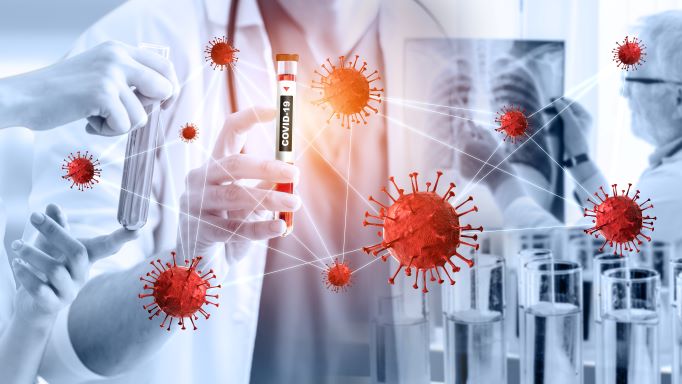 Research published in the journal Nature Medicine suggests a risk for neurological complications after the first shot of a COVID-19 vaccine. However, the likelihood of developing neurological complications remains far greater among people infected with the severe acute respiratory syndrome coronavirus 2 (SARS-CoV-2).
Research published in the journal Nature Medicine suggests a risk for neurological complications after the first shot of a COVID-19 vaccine. However, the likelihood of developing neurological complications remains far greater among people infected with the severe acute respiratory syndrome coronavirus 2 (SARS-CoV-2).
Their findings show that for every 10 million people who were given an AstraZeneca COVID-19 vaccine, about 38 cases were linked to Guillain-Barré syndrome. In this rare disorder, the body’s immune system attacks the peripheral nervous system. For every 10 million people who tested positive for SARS-CoV-2, there were 145 reports of Guillain-Barré syndrome.
“Clinicians should be aware of these rare complications, and the findings from this study will be paramount to policy makers in risk–benefit evaluations and health-care resource allocation. Importantly, the risks of adverse neurological events following SARS-CoV-2 infection are much greater than those associated with vaccinations, highlighting the benefits of ongoing vaccination programs,” concluded the research team.
Developing acute CNS demyelinating events is associated with COVID-19 infection
From December 1, 2020 to May 31, 2021, over 32 million people living in England were given their first AstraZeneca or Pfizer-BioNTech COVID-19 vaccine. Among the vaccinated, about 6% of people tested positive for SARS-CoV-2. However, over 91% of these positive tests occurred before vaccination.
For neurological outcomes, a total of 1,105 people required hospitalization for acute central nervous system (CNS) demyelinating events. About 11.9% of people who acquired this complication tested positive for SARS-CoV-2. The risk of hospitalization for the condition increased on the day of the SARS-CoV-2 test or within two weeks of testing positive for the virus. Less than five deaths were linked to this neurological condition.
No link was found between acute CNS demyelinating events and either of the COVID-19 vaccines.
People who tested positive for SARS-CoV-2 at risk for encephalitis, meningitis, and myelitis
A total of 1,285 people were hospitalized for either encephalitis, meningitis, or myelitis. About 39 deaths (including six who were exposed to SARS-CoV-2) were linked to the AstraZeneca vaccination.
No association was found between the Pfizer-BioNTech vaccine and either of the three conditions.
People who tested positive for SARS-CoV-2 showed an increased risk of hospital admission within two weeks.
Guillain-Barré syndrome
About 622 people were hospitalized for Guillain-Barré syndrome. Of these, 17.7% had tested positive for SARS-CoV-2, including 99 people who had a positive test before vaccination.
Researchers recorded 11 deaths in total. An increased risk of hospitalization or death occurred 3 to 4 weeks after the first dose of the AstraZeneca vaccine.
There was no association between the first dose of the Pfizer-BioNTech vaccine and developing Guillain-Barré syndrome.
An increased risk of Guillain-Barré syndrome was found following a positive SARS-CoV-2 test.
Bell’s palsy
Hospitalization for Bell’s palsy occurred in 3,249 people. About 6% of these patients may have had a concurrent diagnosis of cerebral infarction. This included 10.3% of people with a positive test before vaccination. No Bell’s palsy-related deaths were observed.
An increased risk of hospitalization occurred 2 to 3 weeks after receiving the first AstraZeneca dose. No link was found between Bell’s palsy and the Pfizer-BioNTech vaccine.
Having a positive SARS-CoV-2 test was linked to a greater risk of developing Bell’s palsy.
Myasthenic disorder is associated with SARS-CoV-2 infection and first AstraZeneca dose
About 16.5% of people with a positive SARs-CoV-2 test made up the 831 hospital admissions for myasthenic disorder. Ten of the 30 deaths came from people who were positive for SARS-CoV-2.
An increased risk of hospital admission or death from myasthenic disorder was likely 2 to 3 weeks after the first AstraZeneca dose. Additionally, an increased risk of hospital admission or death was seen in people who test positive for SARS-CoV-2.
No association was found between the Pfizer-BioNTech vaccine and myasthenic disorder.
Increased risk of hemorrhagic stroke observed with SARS-CoV-2 infection and Pfizer vaccine
A total of 3,503 hospital admissions were due to hemorrhagic stroke. Of these, about 13.8% tested positive for SARS-CoV-2, including 392 people who had a positive test before vaccination.
About 803 deaths from hemorrhagic strokes were reported, with 83 coming from people who tested positive for SARS-CoV-2.
No risk between the AstraZeneca vaccine and hemorrhagic stroke was observed. However, there was an increased risk of hospital admission and death 1 to 2 weeks after receiving the first Pfizer-BioNTech vaccine. Additionally, an increased risk of hemorrhagic stroke was found for up to 1 week after a positive SARS-CoV-2 test.
Source: News Medical

















